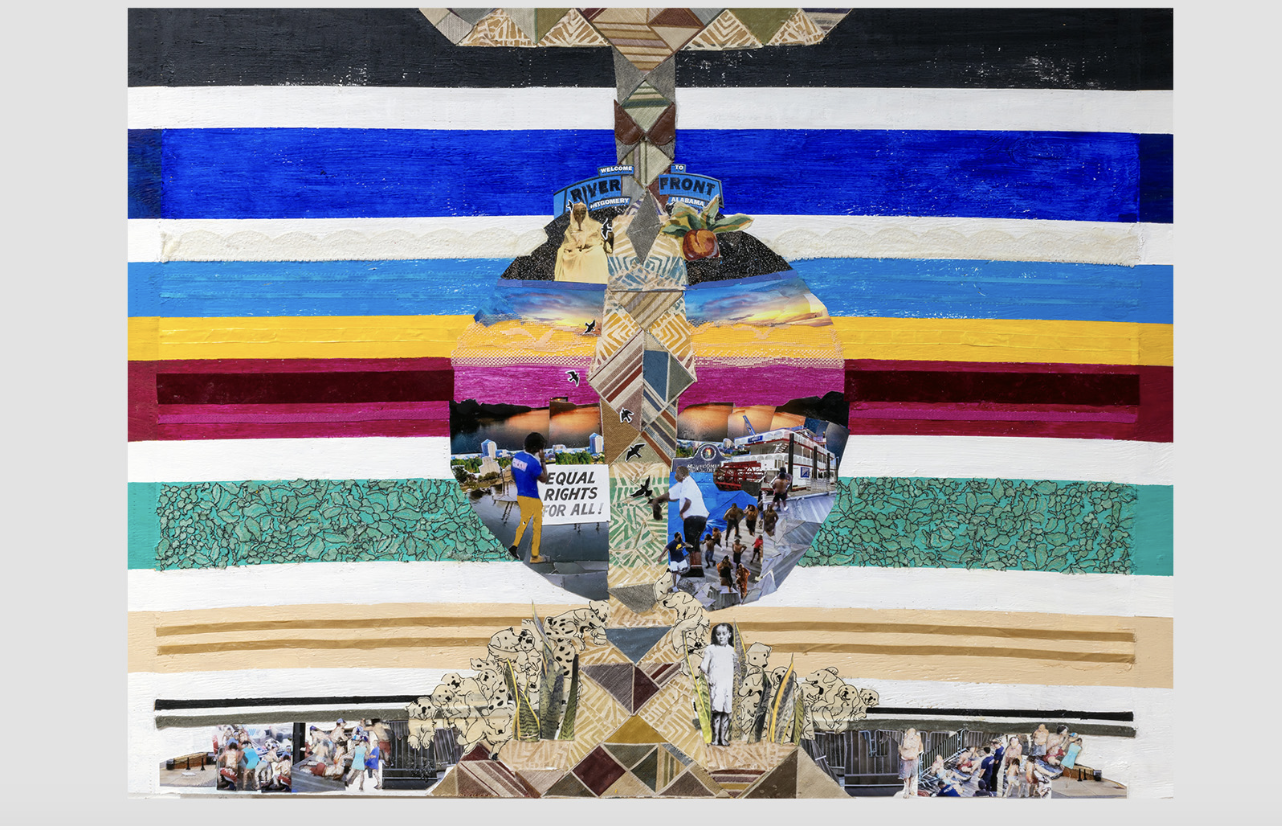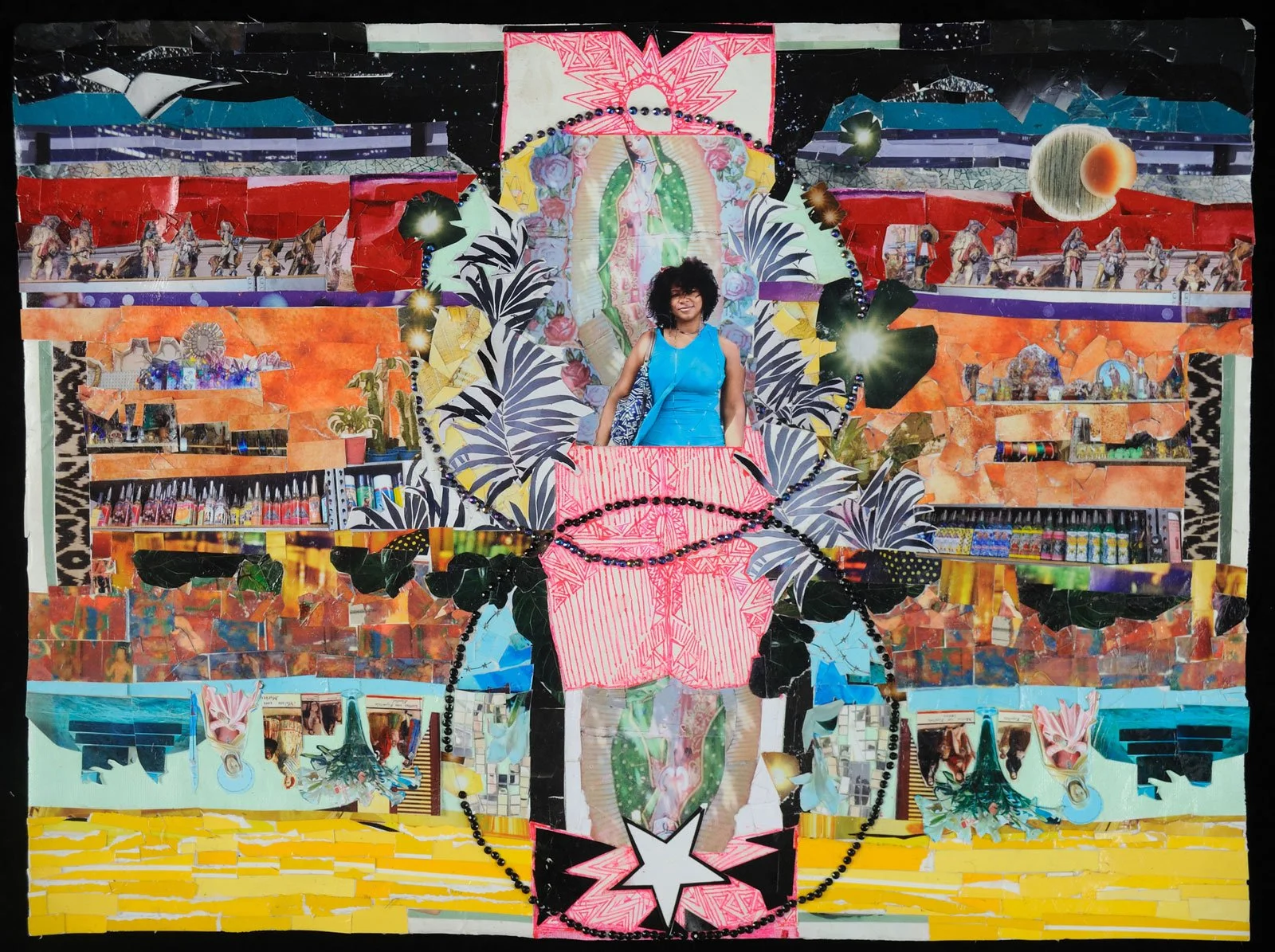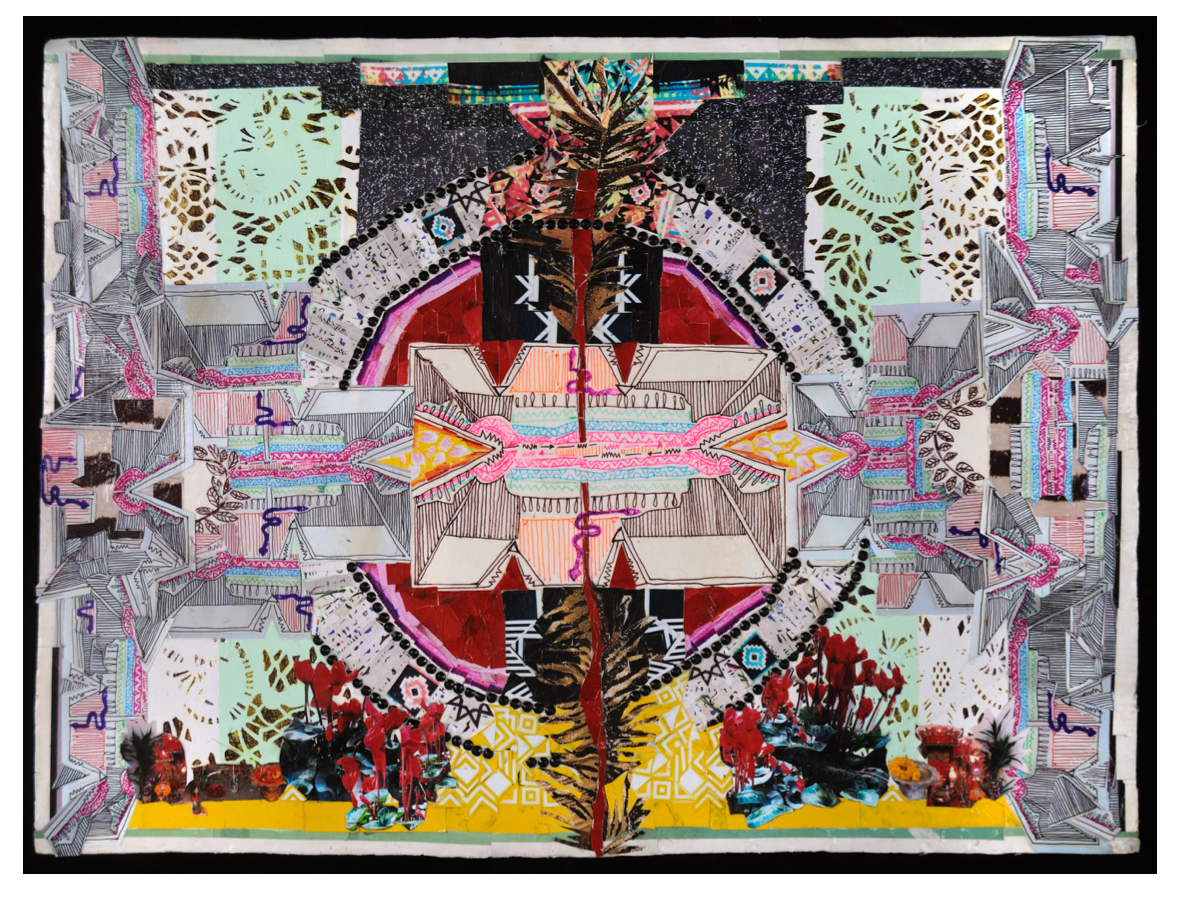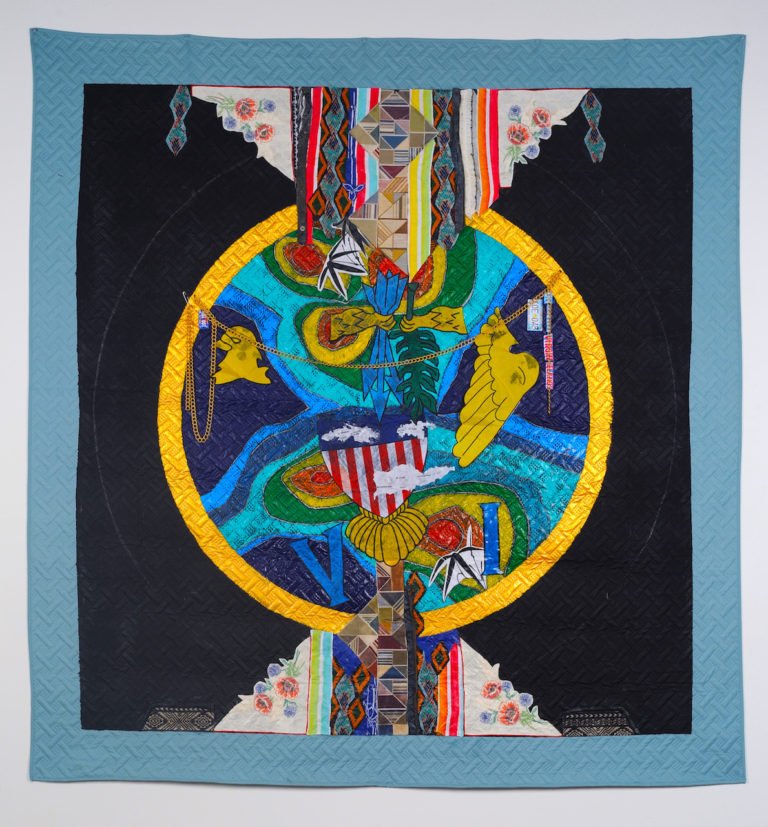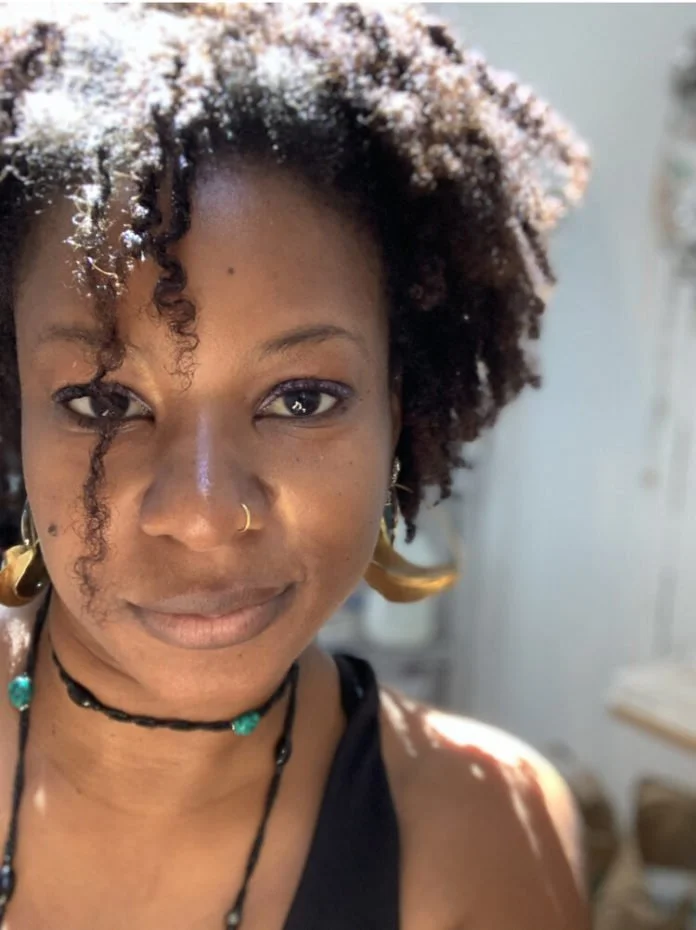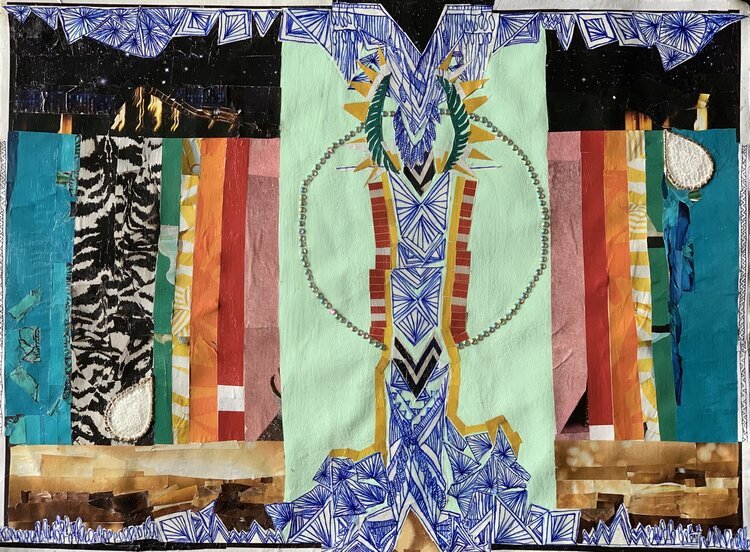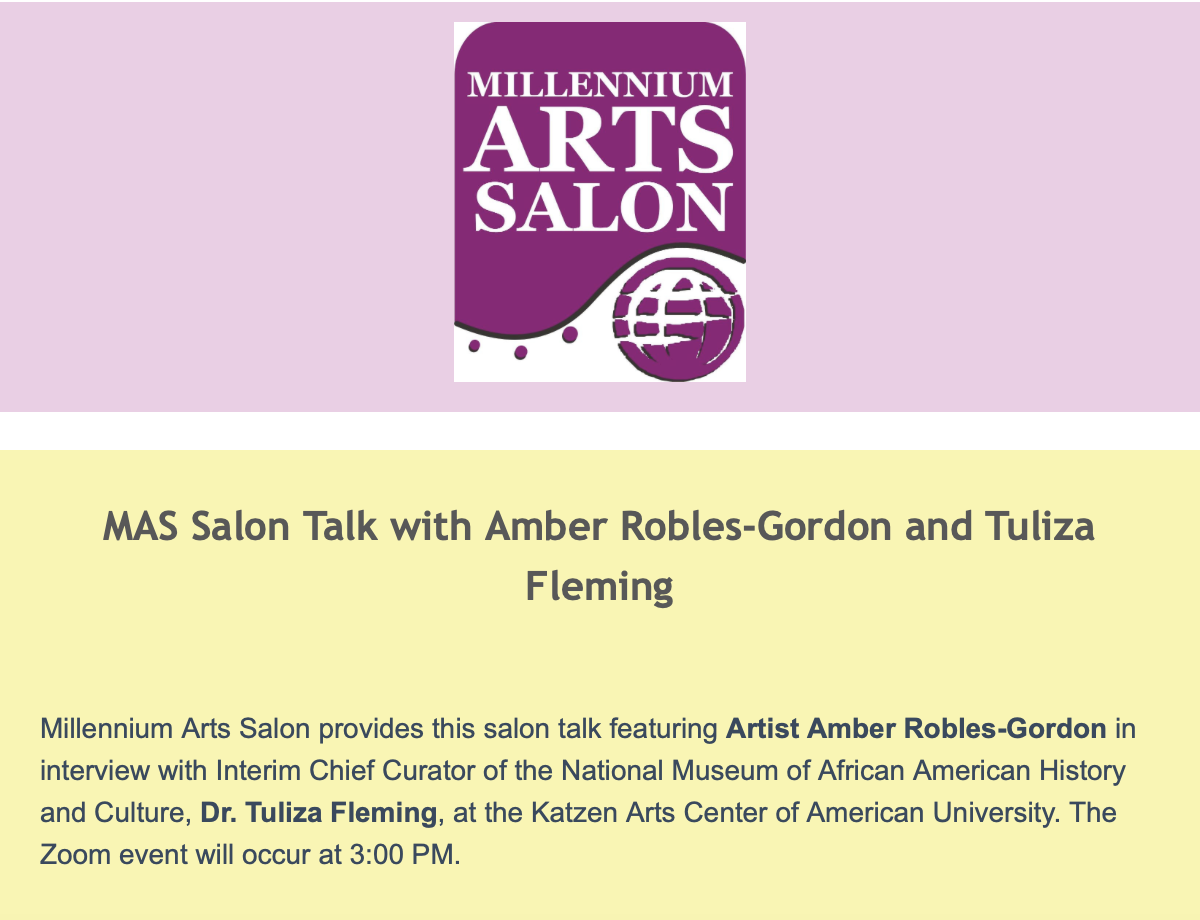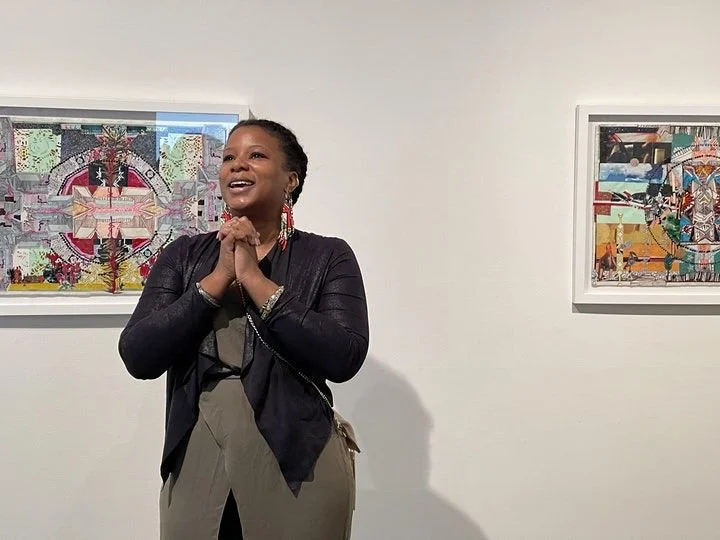Who/what is worthy of care? Who cares for the defenseless? Who/what is defended? Incorporating the transdisciplinary study of human ecology into her practice and scope, Robles-Gordon uses the field as an anchor in her expansive investigations of race, history, the sciences and culture. The resulting new body of work rigorously explores colonialism and imperialism, global anti-blackness, child welfare and animal cruelty. Finding them all connected, just not equally, the exhibition exposes frank contradictions in American perceptions of human life, animal life and minority lives.
Read MoreAmerican University Museum
Millenium Arts Salon & AU Museum: A Conversation between Amber Robles-Gordon & Dr. Tuliza Fleming

On November 13, 2021 the Millennium Arts Salon provided a salon talk featuring Artist Amber Robles-Gordon in an interview with Interim Chief Curator of the National Museum of African American History and Culture, Dr. Tuliza Fleming, at the American University Museum.
Derek Eller Gallery Presents a Solo Exhibition of Mixed-Media Works by Amber Robles-Gordon
Derek Eller Gallery is pleased to present a solo exhibition of mixed media works on canvas by Amber Robles-Gordon. With an array of materials including acrylic paint, fabric, beads, magazine images, photographs, and ink drawings, Robles-Gordon assembles patchwork compositions which interweave her personal narrative within the fraught political, socioeconomic, and environmental threads that define the colonialist relationship between the United States and Puerto Rico.
Read MoreAmber Robles-Gordon’s anti-colonial quilts and personal histories at American University Museum at the Katzen Center
“y mi bandera vuela mas alto que la tuya,” 2020. Mixed media collage on canvas, 18 x 24 in. Courtesy of the artist.
By Andrea KirshDecember 17, 2021
An artist’s visit to her mother’s birth place in Puerto Rico awakens her to the complexities of immigration and family – and to the dubious socio-political actions and inactions, by the U.S. government in its far-flung territories. Our reviewer Andrea Kirsh is moved by the powerful collage works and double-sided quilts of Amber Robles-Gordon. The show closed Dec. 12.
Amber Robles-Gordon‘s first grade classmates in Arlington, VA bullied her for speaking Spanish, so she learned to speak to her mother in English. It wouldn’t be until middle age that the artist finally visited her mother’s birthplace in Puerto Rico. Successions: Traversing U.S. Colonialism, her solo exhibition at the the American University Museum at the Katzen Center (August 28 – Dec. 12, 2021) in Washington, D.C. was the product of that initial trip and a her return for a six-week residence on the island in 2020.
The exhibition presented two bodies of work. The first, “Place of Breath and Birth” is a series of ten vibrant collages on canvas, all 18 x 24 inches; two, represented by full-scale pigment prints. The collages are constructed from masses of tiny images cut from paper; even the bands of color that form their backgrounds are assembled from minute, colored fragments. And there is a very personal rhythm – like distinctive brushwork – in the way Robles-Gordon arranges the fragments.
Another personal language of Robles-Gordon’s appearing in the fragments is inspired by multiple, non-Western cultural traditions and imagery taken from magazines and photographs. These fragments are used as structuring and framing elements, incorporating the artist’s drawings of detailed and decorative, spiky, geometric patterns. An occasional small trinket or charm adds surface texture, as does the profusion of tiny, sparkly beads which outline the central, circular forms on each collage. The beads and high-keyed colors capture the intense sunlight of the Caribbean and lend a festival-like quality to the series.
Robles-Gordon culls her imagery from photographs she took in Puerto Rico or found elsewhere that evoke its lush, intensely-polychromed environment – both natural and human. While on the island, she was fascinated by the rubber trees and palms, the coconuts and mangos, street murals and public art. The titles of individual collages suggest the range of topics that were prompted by her visits: “Observation of Influencers: Taino culture and heritage, the climate and machismo,” “For bioluminescent bays and turtles.”
Her long-time interest in spirituality and syncretic, New World religious practices inspire aspects of the collages’ format, which the artist likens to personal altars. The imagery of fruit and floral offerings, flickering candles and the crystalline forms of her drawing run throughout the series and reinforce their spiritual associations. She includes photos of herself – both earlier and contemporary images – in several collages, and there is no question that the series itself is a diary of self-discovery.
“Reflexiones sobre el yo, la virgen maría y el colonialismo,” 2020. Mixed media, collage on canvas, 18 x 24 in. Courtesy of the artist.
Quilts of pointed anti-colonial critique
If the collages capture Robles-Gordon’s connection to her ancestral culture in the form of personal, spiritual reflection, the second part of the exhibition responded to her developing political understanding of Puerto Rico’s position as a U.S. Territory. The works are a public forum in which to teach, to encourage discussion, to heal, and to begin building a congregation of territorial residents. Six, large, double sided, appliqued quilts hung throughout the high-ceilinged gallery. The installation, which gave its name to the exhibition, was titled “Successions; Traversing U.S. Colonialism.” The quilts include dense references to histories that have yet to be acknowledged and the dark underside of U.S. power. Their format entangles the conventionalized emblems of history and patriotism with the domestic craft of quilting, the masculine pursuit of territory and power with a feminine tradition of healing.
On one side of each quilt Robles-Gordon addresses political history, with references to each of the U.S. Territory’s flag or seal, as well as to the exploitation of its indigenous people for medical experimentation, military support and economic interests; on the other side she constructs an altar dedicated to healing the damage of historical exploitation and the racism which underpins it. Both sides bear central medallions; they are greatly enlarged versions of the circles in the collages, and make references to the circle as a foundational religious image and form of celebration – to healing circles and ceremonial dancing. The healing altars are constructed with the same spiky, geometric patterning that Robles-Gordon used in the collages, and all have hieratic, symmetrical designs. Here they suggest abstracted figures of deities, and their patterning makes reference to a variety of Afro-diasporic and non-Western decorative histories seen in painting, textiles and ceramics. Although painted, they appear to be drawings in chalk on black backgrounds, which suggests religious images in various cultures which are intended to be temporary.
The timing of Robles-Gordon’s residency in Puerto Rico reinforced her understanding of the disparity between U.S. government support to the island after the overwhelming damage from Hurricanes Maria and Irma in 2017, and the level of disaster relief Americans have come to expect on the mainland. This understanding, in turn, led to her interest in the U.S. Territories as a group; areas under United States dominion with the highest percentage of poverty, where the government has exploited resources and sited strategic military bases, with little concern for the inhabitants – all people of color, who are largely, only nominally U.S. Citizens. The territories function, rather, as U.S. colonies.
Puerto Rico, Guam, American Samoa, the Virgin Islands, and the Northern Mariana Islands are unfamiliar to many on the mainland United States. Few Americans know that their residents are U.S. Citizens with the right to vote – although they lack full representation in Congress. Robles-Gordon included Washington, D.C., her current home, among the territories because it’s residents, too, fall under U.S. jurisdiction but have no fully-empowered Congressional representative.
Robles-Gordon used her childhood bullying as a spur to understanding her own cultural traditions, and it is characteristic of her long-developed career of teaching and producing art that she didn’t respond to the history of territorial exploitation with rage, but with honesty, offering understanding, teaching and healing as a foundation on which to advocate for social justice in the outlying regions of the United States and in powerless communities internationally. The sense of spirituality and turning towards a better future pervades her work as much as her personally-developed language of forms and patterns, use of repurposed materials, passionate polychrome, and fusion of visual traditions.
Amber Robles-Gordon, “Successions: Traversing U.S. Colonialism” is now closed. It was on view at the American University Museum at the Katzen Center in Washington, D.C., August 28–December 12, 2021.
“The eternal altar for the women forsaken and souls relinquished. Yet the choice must always remain hers/ El altar eterno de las mujeres abandonadas y las almas renunciadas. Sin embargo, la elección siempre debe ser de ella.,” 2020. Mixed media collage on canvas, 18 x 24 in. Courtesy of the artist.
Hyperallergic
Washington, DC — Seven “flags” hang in Amber Robles-Gordon’s show at the American University Museum: one for each of the five unincorporated United States territories in the Caribbean, one for the District of Columbia, and one to signify the artist’s place in between those locales.
Read MoreMuseums Review In the galleries: Artist’s works criss-cross the paths of U.S. colonialism
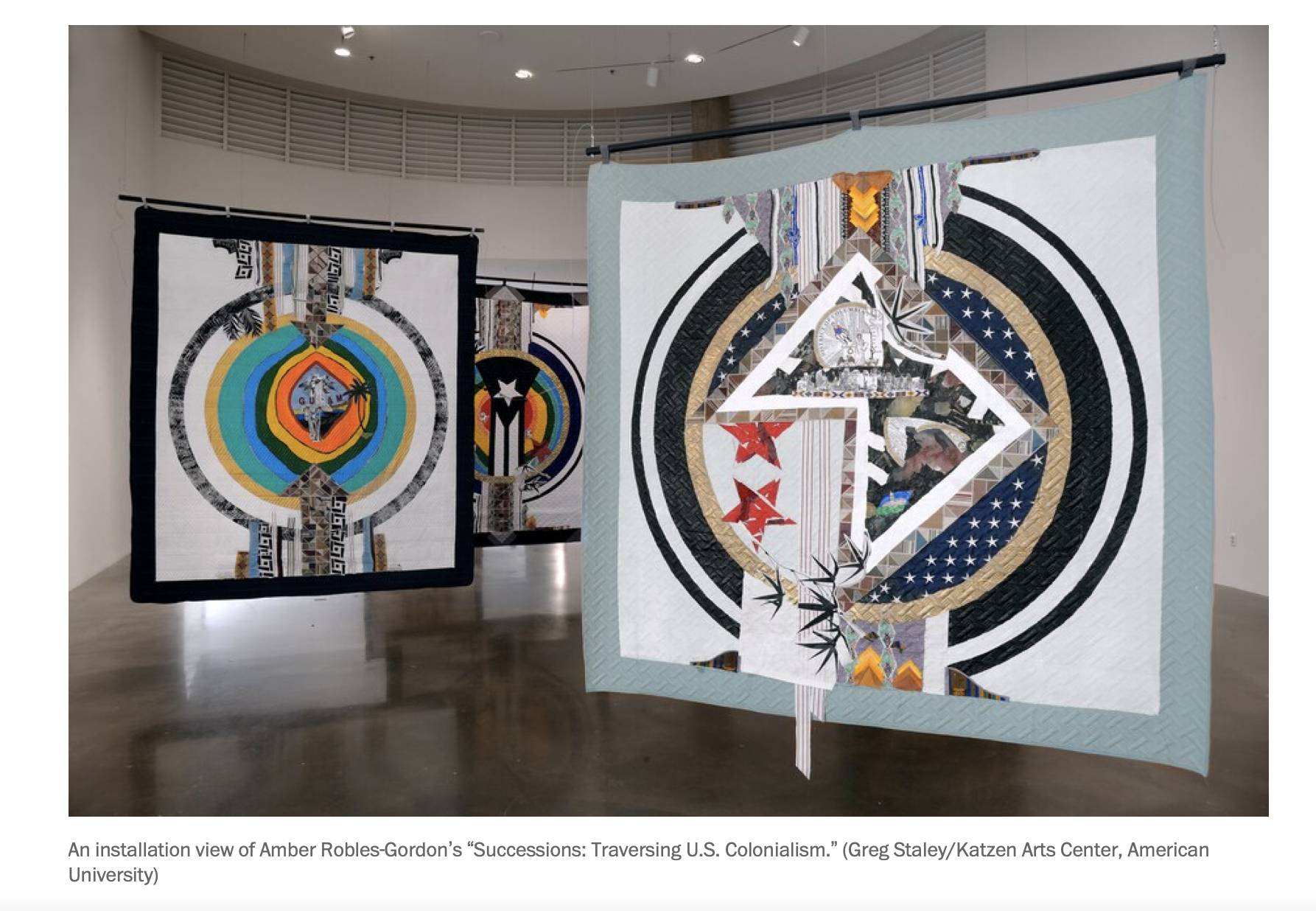
Residents of D.C. are used to seeing the place as an almost-state, much like Maryland or Wyoming, yet not quite. Amber Robles-Gordon, a longtime Washingtonian who was born in Puerto Rico, has a different take. Her American University Museum show, “Successions: Traversing U.S. Colonialism,” groups D.C. with her birthplace and four other inhabited territories: Guam, the U.S. Virgin Islands, American Samoa and the Northern Mariana Islands. She represents these disenfranchised territories on two-sided quilted banners, one face for “political” and the other for “spiritual.”
Read MoreSuccessions: Traversing US Colonialism Listed on BmoreArt’s Picks: November 2-8
This Week: John Oliver’s hand-picked AVAM exhibition, A Passion for Collecting: The Vision of Louis Allan Ford at Galerie Myrtis, Zoë Charlton in conversation presented by Cade Gallery, Bridget Z. Sullivan at Hamilton Gallery, Jonna McKone/Keep A-Knockin’/Noah Breuer/Solo Lab 5 opening at VisArts, Amber Robles-Gordon at the Katzen Art Center, Katie Pumphrey: Night Swim at Project 1628, The Guardians presented by the Peale at Carroll Mansion, and more … plus Maryland Art Place UNDER $500 2021 and other featured calls for entry.
Read MoreAmber Robles-Gordon's Artwork Navigates US Colonialism for its Colonies, including DC
About this event
Millennium Arts Salon provides this salon talk featuring Artist Amber Robles-Gordon in interview with Interim Chief Curator of the National Museum of African American History and Culture, Dr. Tuliza Fleming, at the Katzen Arts Center of American University. Ms. Robles-Gordon, who was born in Puerto Rico, and raised in the DC area, examines the role of the United States as a colonial power with both Puerto Rico and the District of Columbia as two such colonies, with intimations of paternalism, tyranny, and containment of citizen aspiration attendant thereto. Dr. Fleming as scholar, will guide our better understanding of Amber's magnum opus, as she explores the underpinnings of the artwork from conceptualization to execution.
Millennium Arts Salon honors our relationship with the Katzen Arts Center in bringing programs of importance to our joint and several audiences in their beautiful and monumental space.
The MAS Salon Talk will be delivered over Zoom. Please register via the Eventbrite ticket engine and an email of the Zoom link will be sent to you before the event.
Please join us Saturday November 13 at 3:00 pm
Artfully yours,
The Board of Directors of Millennium Arts Salon
Of the Place, An American University, MFA Studio Art Program Sponsored Conversation
The MFA Studio Art program at American University is pleased to present
Of the Place, a series of conversations that center the artists, art organizations, art activators, and culture producers who have deep connections to their locale.
The theme reflects the times that we are living in – many of us have had to stay in place over the last year. The global pandemic, politics, and the cultural circumstances of our contemporary world have necessitated a change in our social and work patterns. We are looking within our own communities to share resources and support.
Read MoreGallery Talk: "Successions: Traversing US Colonialism"

C Artist Amber Robles-Gordon talks "Successions: Traversing US Colonialism" with curator Larry Ossei-Mensah. . "Successions" is a conceptual juxtaposition that celebrates abstraction as an art form while leveraging it as a tool to interrogate past and current US policies within its federal district (Washington, DC) and territories (including Guam, Puerto Rico, and the US Virgin Islands) that it controls. . On view through December 12, 2021. Learn more and plan your visit:
https://www.american.edu/cas/museum/2021/successions.cfm
Read MoreAmerican University Museum at the Katzen Arts Center opens fall exhibitions
Successions: Traversing U.S. Colonialism is a solo exhibition by Amber Robles-Gordon, a conceptual juxtaposition celebrating abstraction as an art form. Robles-Gordon interrogates past and current U.S. policies within Washington, D.C. and the territories (Guam, Puerto Rico and the U.S. Virgin Islands) that it controls…
Read MoreFrom California to Chicago, Tennessee to Maine, 15 of Summer’s Best Museum Exhibitions Remain on View This Fall
A BROAD SELECTION of exhibitions opened at art museums throughout the United States over the summer months. A great number of these shows remain on view, some through September, others further into the fall and beyond. Major traveling exhibitions of Bob Thompson, Joseph Yoakum, and Alma Thomas are underway. The first solo museum exhibitions of Caroline Kent and Simphiwe Ndzube are debuting in Chicago and Denver, while the first survey exhibitions of Jamal Cyrus and Jacolby Satterwhite are on view in Houston and Pittsburgh. Jennifer Packer and Cauline Smith have shows, too. In Nashville, a major retrospective of legendary sculptor William Edmondson is being staged, the first such presentation in two decades:
Read MoreGallery Talk for Successions: Traversing US Colonialism
Gallery Talk: "Successions"
DC mixed-media artist Amber Robles-Gordon talks "Successions" with curator Larry Ossei-Mensah.
About this Event:
Successions is a conceptual juxtaposition that celebrates abstraction as an art form while leveraging it as a tool to interrogate past and current US policies within its federal district (Washington, DC) and territories (including Guam, Puerto Rico, and the US Virgin Islands) that it controls.
This event will be held virtually. Please register to receive the Zoom link via email. Learn more about the exhibition.
OrganizerAmerican University Museum At The Katzen Arts Center
Organizer of Gallery Talk: "Successions"
Housed in the dynamic and multidisciplinary Katzen Arts Center, the American University Museum builds its programming on the strengths of a great college and great university. We focus on international art because American University has a global commitment. We show political art because the university is committed to human rights, social justice, and political engagement. We support the artists in our community because the university takes an active and responsible role in the formation of our contemporary art and culture.
We present exhibitions that mirror American University’s aspiration to be the premier Washington-based, global university. Our programming puts the best art of our region in a national and international context. Our collections enable us to present the art history of Washington, while our Kunsthalle attitude brings the most provocative art of our time to our place.
You may also like the following events from American University Museum at the Katzen Arts Center:
Next month, 12th October, 06:00 pm, Gallery Talk: "Seeing Climate Change"
Next month, 14th October, 06:00 pm, Gallery Talk: "Reveal" in Online
This November, 17th November, 06:00 pm, Gallery Talk: “In the Light of Memory” in Online
Also check out other Arts Events in Online,Exhibitions in Online.
Ticket Information: RSVP
Tickets for Gallery Talk: "Successions" can be booked below.
https://www.eventbrite.com/e/gallery-talk-successions-tickets-163405503259
Ticket Price: Free
Image: Amber Robles-Gordon, y mi bandera vuela mas alto que la tuya (detail), 2020. Mixed media collage on canvas, 18 x 24 in. Courtesy of the artist.
Successions: Traversing US Colonialism Amber Robles-Gordon
August 28–December 12, 2021
American University Museum Curated by
at the Katzen Arts Center Larry Ossei-Mensah
Amber Robles-Gordon presents Successions: Traversing US Colonial- ism, a solo exhibition on view at the American University Museum at the Katzen Arts Center in fall 2021. Successions is a conceptual juxta- position that celebrates abstraction as an art form while leveraging it as a tool to interrogate past and current US policies within its federal district (Washington, DC) and territories (including Guam, Puerto Rico, and the US Virgin Islands) that it controls. By highlighting nuances relat- ed to US governance in its federal districts and territories, Robles-Gor- don seeks to question who has access to resources, citizenship, and the right to sovereignty.
y mi bandera vuela mas alto que la tuya., Mixed Media Collage on Canvas, 18 x 24 in., 2020
Robles-Gordon creates artwork imbued with a layered visual language replete with cultural signifiers and abstract gestures. Successions is a celebration of abstraction as an artistic expression. Robles-Gordon uti- lizes iconic artists like Robert Rauschenberg, Alma Thomas, Romare Bearden, and members of the Washington Color School as vivid refer- ence points for her own dynamic use of color, form, and material within the works she created for the exhibition. These explorations will provide insights into a number of inquiries that undergird the construction of the exhibition. Successions creates a pathway towards discursive crit- icism around issues impacting marginalized communities oppressed by the United States’ hegemonic domestic and foreign policies. The exhibition features a new body of colorful abstract paintings, collages, and quilts created in 2020 and 2021 between San Juan, Puerto Rico (Robles-Gordon’s birthplace) and Washington, DC (where she current- ly lives).
USVI Political, Detail, Front, Mixed Media on Quilt, 86 in. x 90 in., in., 2021
During the height of the COVID-19 pandemic, Robles-Gordon’s creative strategies were directly impacted as a result of sheltering in place in San Juan. The lack of access to materials and arduous circumstances she was confronted with in Puerto Rico and upon returning to Washington, DC catalyzed Robles-Gordon to impro- vise her approach to making works for the exhibition. Moreover, the ex- perience heightened her awareness of how communities on the margin are adversely treated during mo- ments of crisis.
Robles-Gordon’s also uses works featured in Successions to mine the stories, personal narratives, and aesthetics of the women of the Caribbean, particularly of African de- scent, in an effort to investigate the political, socio-economic, and envi- ronmental implications of placemaking, contemporary colonial policy, and notions of citizenship on these social groups. The debate over DC statehood, similar to Puerto Rico, has been a prevalent point of con- tention in the District but rarely featured in the national conversation. Robles-Gordon seeks to use her “backyard” as a metaphor that would
expand our understanding of notions of freedom, liberty, and justice.
A fully illustrated catalog with essays by Ossei-Mensah and Noel Anderson and in-person and virtual programs will accompany the exhibi- tion, enriching the viewer’s experience.
Successions: Traversing US Colonialism @ American University Museum at the Katzen Arts Center
Amber Robles-Gordon
Curated by Larry Ossei-Mensah
August 29–December 12, 2021
DC Political, Welcome to the District of Colonialism, Front, Mixed Media on Quilt, 86 (L) in. x 90 (H) in., 2021
Amber Robles-Gordon presents Successions: Traversing US Colonialism, a solo exhibition on view at the American University Museum at the Katzen Arts Center in fall 2021. Successions is a conceptual juxtaposition that celebrates abstraction as an art form while leveraging it as a tool to interrogate past and current US policies within its federal district (Washington, DC) and territories (including Guam, Puerto Rico, and the US Virgin Islands) that it controls. By highlighting nuances related to US governance in its federal districts and territories, Robles-Gordon seeks to question who has access to resources, citizenship, and the right to sovereignty.
Robles-Gordon creates artwork imbued with a layered visual language replete with cultural signifiers and abstract gestures. Successions is a celebration of abstraction as an artistic expression. Robles-Gordon utilizes iconic artists like Robert Rauschenberg, Alma Thomas, Romare Bearden, and members of the Washington Color School as vivid reference points for her own dynamic use of color, form, and material within the works she created for the exhibition. These explorations will provide insights into a number of inquiries that undergird the construction of the exhibition. Successions creates a pathway towards discursive criticism around issues impacting marginalized communities oppressed by the United States’ hegemonic domestic and foreign policies. The exhibition features a new body of colorful abstract paintings, collages, and quilts created in 2020 and 2021 between San Juan, Puerto Rico (Robles-Gordon’s birthplace) and Washington, DC (where she currently lives).
During the height of the COVID-19 pandemic, Robles-Gordon’s creative strategies were directly impacted as a result of sheltering in place in San Juan. The lack of access to materials and arduous circumstances she was confronted with in Puerto Rico and upon returning to Washington, DC catalyzed Robles-Gordon to improvise her approach to making works for the exhibition. Moreover, the experience heightened her awareness of how communities on the margin are adversely treated during moments of crisis.
y mi bandera vuela mas alto que la tuya, 2020. Mixed media collage on canvas, 18 x 24 in. Courtesy of the artist.
Robles-Gordon’s also uses works featured in Successions to mine the stories, personal narratives, and aesthetics of the women of the Caribbean, particularly of African descent in an effort to investigate the political, socio-economic, and environmental implications of placemaking, contemporary colonial policy, and notions of citizenship on these social groups. The debate over DC statehood, similar to Puerto Rico, has been a prevalent point of contention in the District but rarely featured in the national conversation. Robles-Gordon seeks to use her “backyard” as a metaphor that would expand our understanding of notions of freedom, liberty, and justice.
Reflexiones sobre el yo, la virgen maría y el colonialismo, (Reflections of Self, The Virgin Mary and Colonialism,) Mixed media, collage on canvas, 18 x 24 in. Courtesy of the artist.
A fully illustrated catalog with essays by Ossei-Mensah and Noel Anderson and in-person and virtual programs will accompany the exhibition, enriching the viewer’s experience.
Click the link below for additional information and artwork included in the exhibition.
https://www.american.edu/cas/museum/2021/successions.cfm
About the Artist:
Amber Robles-Gordon is a mixed media visual artist of Puerto Rican and West Indian heritage. She is known for her commissioned temporary and permanent public art installations for numerous government agencies, institutions, universities, and art fairs.
Robles-Gordon has over twenty years of experience exhibiting and in art education, commissioned critiques, lectures, teaching, and exhibition coordination. She received a BS in business administration from Trinity University and an MFA in painting from Howard University, Washington, DC. She has exhibited nationally and internationally, including Germany, Italy, Malaysia, England, and Spain. Robles-Gordon has participated in residencies in Costa Rica, Washington, DC, and at the American Academy in Rome, Italy. Her artwork has been reviewed and featured in numerous magazines, journals, newspapers, and online publications.
Most recently, she held an online solo exhibition at Galeria de Arte, Universidad del Sagrado Corazón, San Juan, Puerto Rico, and was featured by Tafeta Gallery in the 1-54 Contemporary African Art Fair in London, England, and during London Art Week. In 2022, she will create a traveling exhibition in collaboration with Cultural DC and El Cuadrado Gris Galeria in Puerto Rico.
About the Curator:
Larry Ossei-Mensah uses contemporary art as a vehicle to redefine how we see ourselves and the world around us. A Ghanaian-American curator and cultural critic, Ossei-Mensah has organized exhibitions and programs at commercial and nonprofit spaces around the globe from New York City to Rome, featuring artists including Firelei Baez, Allison Janae Hamilton, Brendan Fernades, Ebony G. Patterson, Modou Dieng, Glenn Kaino, Joiri Minaya and Stanley Whitney. Moreover, Ossei-Mensah has actively documented cultural happenings featuring the most dynamic visual artists working today, including Derrick Adams, Mickalene Thomas, Njideka Akunyili Crosby, Federico Solmi, and Kehinde Wiley.
A native of The Bronx, Ossei-Mensah is also the co-founder of ARTNOIR, a 501(c)(3) and global collective of culturalists who design multimodal experiences aimed to engage this generation’s dynamic and diverse creative class. ARTNOIR endeavors to celebrate the artistry and creativity of Black and Brown artists around the world via virtual and in-person experiences. Ossei-Mensah was a contributor to the first-ever Ghanaian Pavilion for the 2019 Venice Biennial with an essay on the work of visual artist Lynette Yiadom-Boakye.
Ossei-Mensah is the former Susanne Feld Hilberry Senior Curator at MOCAD in Detroit and currently serves as Curator-at-Large at Brooklyn Academy of Music (BAM), where he curated the New York Times heralded exhibition Let Free Ring and A Return: Liberation as Power respectively.
Ossei-Mensah has been profiled in publications including the New York Times, Artsy, and Cultured Magazine, and was recently named to Artnet’s 2020 Innovator List. Follow him on Instagram at @larryosseimensah and Twitter at @youngglobal.
